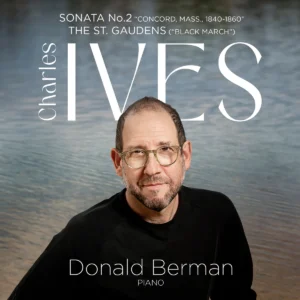Donald Berman plays Ives (CD Review)
Donald Berman
Ives
Avie, 2024
Pianist and scholar Donald Berman has made a special inquiry into the music of American hyper-modernist composers, Charles Ives chief among them. This year marks the sesquicentenary of Ives’s birth, and Berman celebrates the occasion with an Avie CD of the original piano version of St. Guadens (“The Black March”), best known as one of the movements of the orchestra piece Three Places in New England, and his own scholarly edition of the totemic Piano Sonata No. 2, Concord Mass., 1840-1860, usually known by its nickname, the “Concord Sonata.”
One of the challenges of these pieces is the importance of spatiality in Ives’s approach to composition. In the liner notes, Berman acknowledges this, stating the goal of creating “three-dimensional” versions of the programmed works. In a two-channel stereo recording of a stationary piano, one cannot hope to mirror the spatiality of the orchestral version of Three Places in New England, where voices move through the orchestra and are bent in a simulacrum of the doppler effect. The piano score for St. Gaudens attempts this through shifts of register, texture, tempo, and dynamic that provide impressive contrasts. Civil War era songs and one by Stephen Foster are quoted. St. Gaudens is named after the statue on Boston Common of the 54th Massachusetts Regiment, the first of all African-American soldiers. Their history was a bloody one, and, in a moving performance, Berman leans into the bellicose sections and allows for the softer ones, particularly the diaphanous coda, to emerge as wisps of sound.
St. Gaudens is a fine introduction to Ives’s approach at the piano, but the Concord Sonata presents his aesthetic writ large. Each of the four movements is dedicated to American transcendentalists: Emerson, Hawthorne, the Alcotts, and Thoreau. Transcendentalism was an important philosophical trend that shaped the thought of many Americans: philosophers, poets, novelists, artists, and, especially in Ives’s case, musicians. His concept of transcendentalism in music involves the aforementioned soundworld, as well as liberal quotation of sacred and secular tunes, often overlapping. At three quarters of an hour long, the stamina required by the piece is most formidable.
Berman possesses both the virtuosity and interpretative acumen to give the sonata one of its most compelling recordings to date. “Emerson,” the sprawling eighteen-minute long first movement, could easily sound amorphous, but the pianist finds the formal boundaries and grounding lines in its diverse material. Some performers of Ives, perhaps giving recourse to the cranky elements of his biography, don’t understand the musicality that can be brought to bear instead of stentorian caricature. Indeed, Berman’s performance of “Emerson” captures dynamic nuances that few others adopt. In “Hawthorne,” Berman prioritizes bold rhythmic cross-accentuations and dramatic shifts from impressionist-tinged solos to a dissonant passage from one of Ives’s favorite songs, “They Are There.” There is a fair bit of proto ragtime in the latter part of the movement, as well a march filled with multiple quotes shifting kaleidoscopically. It ends with a bold, ascending chromatic scale.
“The Alcotts” is the briefest of the four movements, balancing hymnody, parlor piano of a Scottish cast, and a reharmonized rendition of the motive from Beethoven’s Fifth Symphony. There is also a melody often used by Ives, “the Human Faith” theme. The final movement, “Thoreau,” begins with the diaphanous music that Ives often uses to depict walking in nature, in this case, likely Thoreau’s beloved Walden Pond. In a gradual buildup, whole tone scales vie against chromaticism, and the Beethoven 5th Symphony motive returns to announce the final section. The coda brings the piece back to the Walden Pond music, as if a ruminative walk has found Thoreau returning to his cabin. Berman’s keen sense of molding frequent contrasts into a narrative concludes the piece with a thoughtful portrait of the most emblematic transcendentalist.
Berman’s Ives CD is one of my favorites thus far in 2024. Highly recommended.
- Christian Carey
